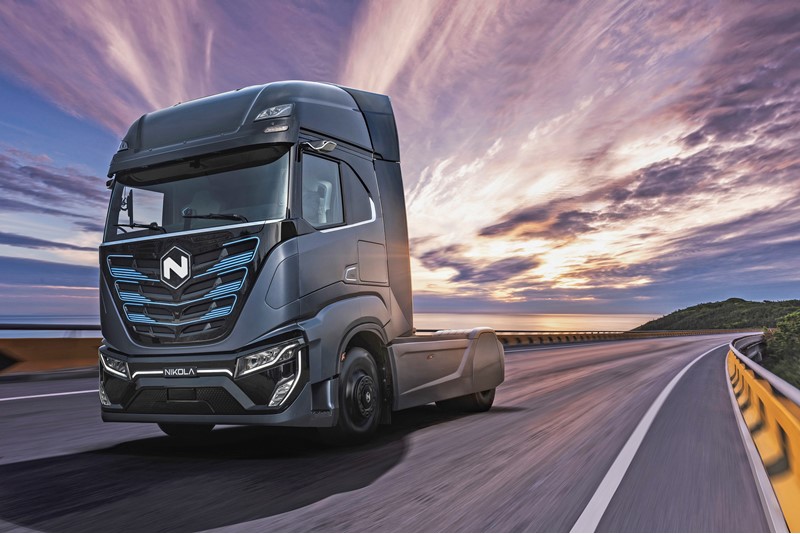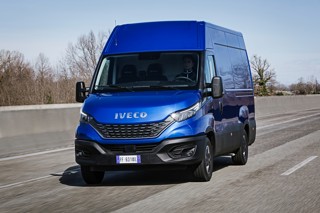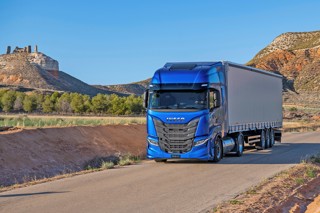Iveco will embark on a programme of UK truck launches in the last quarter as the coronavirus pandemic slackens its grip on the economy, says global brand president Thomas Hilse.
Leading the charge will be the new S-Way tractor unit, which was due to get its send-off at the Commercial Vehicle Show back in April before Covid-19 brought about the event’s cancellation.
The company will also launch the new X-Way. Targeted at tipper fleets and other businesses involved in construction, the current X-Way offers a competitive payload. Its successor, which will share S-Way’s cab, will deliver the same advantage.
Both the S-Way and the X-Way will be right-hand -drive versions.
Iveco will also be rolling out a left-hand-drive version of the heavy-duty T-Way for construction applications. It will not arrive here in right-hand-drive until next year. Succeeding the equally-robust Trakker, it should be just as unbreakable.
Like Trakker, however, it will not offer X-Way’s payload benefits which means the T-Way may only sell in small numbers in the UK.
An all-new Eurocargo is some distance away. The current model will receive an upgrade, says Hilse. We asked when, but he was unable to comment.
The latest Daily is already here, but not yet in battery-electric guise.
“We should have an electric version of the new Daily available in the UK in two years’ time,” says Hilse. “It will have a longer range than the previous model and the price will be lower because the price of batteries is falling.”
Daily is increasingly being specified with the impressive eight-speed H-Matic automatic gearbox, he reports.
“Up to 50% of customers are taking it, and that could increase to 75% over the next five years,” he predicts. “They like it because it offers reduced fuel usage, longer clutch life and increased driver comfort, and should increase the residual value.”
Iveco’s European assembly plants are in production again as countries emerge from the Covid-19 lockdown. The majority were closed from late March to early May.
“Line speed is getting back to normal and we’re suffering no problems with component supplies,” Hilse says. “The factories are working on single shifts at the moment, but they should soon be able to move up to the next level as the order intake picks up.”
It will take up to two years before markets return to pre-Covid-19 levels, he predicts. “I think we’ll see a total 30% to 35% decline in registrations of trucks this year,” he says.
A scrappage programme leading to the withdrawal of older, less environmentally-friendly trucks would give sales a fillip and is being contemplated by several governments. But Hilse believes it needs a Europe-wide solution.
Older diesel vehicles could end up being replaced by trucks powered by compressed natural gas (CNG) or liquefied natural gas (LNG). As well as being environmentally-friendly, both fuels are proving to be increasingly practical bets and have been enthusiastically embraced by Iveco.
“We’ve already shown that an LNG truck can travel up to 1,600kms (almost 1,000 miles) before its tanks need refilling,” Hilse says.
He stresses the emission benefits of bio-LNG made from renewable biomass. It can cut CO2 emissions by approximately 80% compared with diesel and produces low levels of NOx and particulates.
“It’s available now, and production is increasing,” he says.
Collaboration with Nikola

Hydrogen is another route Iveco is pursuing in conjunction with US manufacturer Nikola in a project that was announced late last year.
A 400PS tractor unit based on Iveco’s new S-Way using Nikola’s zero-emission fuel cell technology is set to go on sale in 2023. “We’ll be building it in our Ulm factory in Germany,” Hilse says.
Using the platform of a conventionally-engineered truck as the launch-pad for fuel cell technology and taking advantage of Iveco’s ability to build commercial vehicles in quantity, makes sense for both parties. “I’m sure our competitors would like to be in our position,” he says.
Hilse is thinking of Volvo Group and Daimler Truck’s plan announced earlier this year to form a joint venture with the aim of developing and producing fuel cell systems for trucks in large volumes. The agreement with Nikola has put Iveco ahead of its rivals, he contends.
It will be some time before fuel cells displace other environmentally-friendly forms of propulsion, however. Hilse predicts that by 2030 several technologies will have emerged as mainstream choices for truck fleets, including fuel cells, bio-LNG and battery electric.
“Remember that, by 2050, trucks will have to be completely emission-free as a result of the Green Deal,” he says. “That is likely to mean 2040 for our industry given how long trucks last.”
Again based on S-Way, a battery-electric tractor unit developed jointly with Nikola with an expected range of 400km (250 miles) should be on the road with fleets in 2021. So-called glider Eurocargo chassis – chassis with their engines and gearboxes removed – are being delivered to Electra Commercial Vehicles in Lancashire for conversion to battery electric power.
While connectivity is becoming increasingly important – it is a key feature of S-Way’s design – Hilse does not believe it will lead to a widespread adoption of platooning. The technology works, but the fuel savings promised are simply are not there given European driving conditions, he says.
Cars cutting in
Attempt to employ it on a congested motorway and you will find that a car tries to get between the platooning trucks every two or three kilometres, says Hilse. If they are obliged to draw apart from one another again and again, then any advantages are lost.
It might work on long-distance runs in the USA, on highways that are not peppered with junctions constantly used by vehicles entering and leaving the traffic stream, he suggests. Autonomous trucks might work under the same conditions, but he does not envisage their widespread European adoption anytime soon, either.
“I don’t see driverless trucks being used in Europe to any great degree during the next 10 years,” he says. “The technology is in place, but there are legal and ethical questions that still have to be addressed.”
He worries all the talk about autonomous trucks may turn out to be counterproductive because it could deter youngsters from becoming drivers at a time of acute shortage. Why join an industry that might be on the verge of eliminating your job?
“I think it might scare them away,” he says. ”That can’t be a welcome development given we need to incentivise young people to take up the profession.”




















Login to comment
Comments
No comments have been made yet.